- Home
- Malorie Blackman
Noble Conflict Page 6
Noble Conflict Read online
Page 6
‘Oh, OK,’ said Kaspar, trying to foster some patience.
They sat in silence for a moment. Mac turned to another data screen to resume what she was doing before Kaspar had interrupted her. Kaspar stole surreptitious glances at Mac. He’d never seen anyone quite like her before. She was about as far away from his old life on his uncle’s farm as it was possible to get.
‘Is something wrong?’ asked Mac, even though she wasn’t directly facing him.
‘No. Why?’ Kaspar’s gaze instantly returned to the data on the screen.
‘You’re staring a hole through me.’ Mac swivelled round in her chair to look directly at him, amusement in her voice.
Where had Kaspar heard that phrase before?
‘It’s my eyes, isn’t it?’ said Mac. ‘People always notice my eyes.’
Kaspar frowned at Mac. Her hair colour and style had caught his attention more than . . . The twinkle in Mac’s honey-coloured eyes alerted Kaspar to the fact that he was being wound up.
‘Yeah, it was definitely your eyes,’ Kaspar agreed with a grin.
They both laughed.
‘So, Mac, if you don’t mind me asking, how long have you worked here?’
‘Three years. Since I was sixteen.’
‘Only three years?’ said Kaspar, astounded. ‘Congrats. I thought you had to have one foot in the grave to get red security clearance.’
‘Or be the only member of the library staff to be working late at night when an insomniac general can’t get the data she requires because she doesn’t know how to access it and you don’t have the proper clearance,’ grinned Mac.
Ah, that explained a lot. ‘This general must’ve been desperate.’
‘She was,’ said Mac.
‘What made you want to work here in the first place?’ Kaspar couldn’t help asking.
‘Knowledge is power. My dad is always telling me that.’ Mac looked at Kaspar pointedly when she said that, then laughed as if she’d heard a good joke and changed the subject. Kaspar gave her a sideways look, wondering at her in-joke which left him on the outside. He shrugged inwardly. Mac was kind of weird.
After about half an hour of albeit pleasant small talk, Kaspar could wait no longer. He turned back to the screen and started appreciating. There were maps and charts, timelines and frequency counts, all showing the details of the Insurgents’ attacks on the Alliance, stretching back for years. But what was missing was any kind of coherent pattern or wholeness to it all.
‘That’s strange. Looking at what seems to have been targeted, there seems to be two separate groups working,’ Mac mused aloud, peering over his shoulder. ‘What did you say the one who stabbed himself looked like? A ninja? Well, let’s call them ninjas and the others . . . phantoms. The ninjas are really good at getting into places they aren’t meant to be. They’re not particularly violent – the casualty rates resulting from their actions are surprisingly low, even though they sometimes hurl flash grenades around like confetti – like at your graduation ceremony. They love getting access to Alliance computers and their motto is apparently “You’ll never take me alive” – judging by the number of attempted suicides that have taken place before you Guardians have been able to make an arrest. I think, for the ninjas, it’s all about psychological confusion rather than actual physical damage. That and keeping the Guardians occupied.
‘But look at the other kinds of incidents – when there are bombings and lots of casualties. That seems to be a completely different way of operating. That’s the work of the vicious ones, the phantoms. And they’re never seen – the arrest rate is non-existent, although there’ve been some deaths reported occasionally, like when they get caught up in their own explosions. They’re the ones who plant bombs in public places and really work the terror angle.’
‘You can tell all that from this stuff on the screen?’ said Kaspar, moving in closer to try and see what Mac was seeing.
‘Like all this stuff, it’s about knowing what you’re looking at and how to interpret it,’ said Mac. ‘Check it out. Look, the intelligence suggests that there are definitely two different types of groups where one group doesn’t seem to know what the other group is doing. As I said, one lot seem to go for the computers, to attack our communications and technology, while the other lot carry out violent terrorist atrocities on civilians.’
‘But look at the rate of the attacks,’ said Kaspar. ‘The ninja attacks and the phantom bombings ramp up in synch. Doesn’t that imply coordination?’
‘Or maybe competition between two groups of Insurgents, each with different aims and methods?’ suggested Mac. ‘Maybe rival political parties among the Crusaders?’ Suddenly alert, she drew Kaspar’s attention to a flag on the screen. ‘Oh, hello! We’ve got an out-of-tolerance hybridization factor.’
Kaspar looked at her blankly. ‘We’ve got a what?’
‘The bots might be off the leash,’ she explained.
Leaning in closer, Kaspar saw that a group of bots were researching the suicide angle. ‘Suicide, suicide bombings, sanctity of all life, honourable death, atonement for failure, unrequited love, intractable pain, shared near-death experiences, mythical heroes of legend . . .’
The bots were definitely starting to wander a little too far off-topic.
‘I’m not really in the market for poems of hopeless love or fairy stories. Can we lace up the straitjacket a little tighter?’ asked Kaspar.
‘Sure.’ Mac sent an advisory to the search engine and the bots raced off in another direction.
‘What I’m after is more insight into the terrorists’ psychology,’ said Kaspar. ‘Can we nudge the bots in the direction of the interrogation reports on the Insurgent captives?’
Mac issued the commands and then read through the summary. ‘It’s all variations on a theme.’ She frowned. ‘Some long-suffering body from the Justice Directorate spends hours offering the captured Insurgents coffee and biscuits and asking questions. In return, they get nothing but meaningless rants, abuse, vile threats and some hair-raising displays of self-harming. Finally they give up and write an intelligence assessment that seems little better than reading tea leaves.’
‘So let me see if I’ve got this right,’ said Kaspar, exasperated. ‘The enemy is stupid but quite smart sometimes. They are precise in their targeting – though we don’t know what they are looking for in our data archives – except for when they go for some pointless bloody massacre of civilians. Some of them trap themselves when they could escape, some stab themselves when they could shoot you, and others are totally invisible except when they stand right in front of you and smile.’
‘I couldn’t have put it better myself,’ said Mac.
‘Yeah, but that gets me precisely nowhere,’ Kaspar sighed.
‘What can I tell you? The data is the data.’
Kaspar tried to bite back his intense disappointment. But what made him think he could discover more about the Insurgents and their motives in a couple of hours than the High Council had in decades? It was just that no one seemed to be asking questions – the right questions, at any rate. Kaspar couldn’t forget the smile on the face of the Insurgent who had killed himself. His expression hadn’t been that of someone thwarted or defeated or even defiant to his last breath. No, his smile had been one of satisfaction, of triumph. And there was no hint of insanity in the Insurgent’s final expression, at least none that Kaspar’s admittedly untrained eye could see. The High Council didn’t seem to care about the Insurgents’ deeper motives. As long as the Insurgent threat was being contained, that seemed to be enough for them and most of the Alliance civilians. Why were there never any serious calls for talks to end the war?
What did the Insurgents want?
There had to be a rhyme and reason to what they were doing, at least in their heads. So what was it? Why weren’t the High Councillors actively seeking answers on that front? The Guardians certainly didn’t question the motives behind the Insurgents’ actions; that wasn’t their job. But Kaspar
was troubled. He needed to make sense of his enemy, to convince himself that what he was doing was right.
‘Thanks for your help, Mac.’ He stood up. ‘I really do appreciate it, but I’m no further forward.’
‘Give it time. Give yourself a chance to mull over what we’ve just learned,’ Mac replied. ‘You can’t expect to find all the answers you wanted in one evening.’
But that was the problem, because Kaspar had hoped for some insight, some inkling as to the Insurgents’ motives.
‘I think I just wasted your time and my evening,’ Kaspar sighed.
‘So you’re going to give up then?’ said Mac. ‘Already?’
‘No. I’m not.’ Kaspar’s lips set into an obstinate line.
‘Good!’ smiled Mac. ‘Then I’ll see you tomorrow, Guardian.’
After the War to End All Wars, the will of the people decreed that twenty-one High Councillors should be elected to serve for all time the needs of the Alliance. Those who would be High Councillors were subjected to rigorous physical and psychological testing. In a process which took not just months but years, finally twenty-one High Councillors were chosen. Consensus decreed that the High Councillors would pass their role on to their children and their children’s children, thus there would never be the battles for power we in the Alliance had seen throughout our history.
But how to keep the High Councillors safe from those so-called Crusaders who would seek their destruction?
There was only one solution. The High Councillors must never all be in the same place at the same time. This edict was pronounced, not just to protect the High Councillors, but for the very survival of the Alliance. We in the High Council were – and are – deemed to be the new guiding hand, leading those who follow us to a new beginning, a brighter future and a promise that the interests of the Alliance will always be protected.
Extract taken from ‘Towards a New Morality’ by Sister Madeleine
11
If Kaspar was depressed at the outcome of his search, things got markedly worse at 0700 hours the next morning. He was just sitting down to breakfast with Dillon and Janna when he got paged on his CommLink.
MY OFFICE. NOW. VOSS.
‘Oh, hell!’ said Kaspar.
‘What’s the matter?’ asked Janna.
‘Why would Voss want to see me?’ Kaspar frowned.
Dillon gave Kaspar a speculative look. ‘Voss never sees anyone before his fifth cup of morning coffee and he’s probably only on his second or third, so whatever the reason I’ll bet it’s not good.’
‘Thanks for that.’ Kaspar stood up and glared at his friend. As if he wasn’t anxious enough.
‘Any time,’ Dillon grinned.
Janna shook her head at Kaspar pityingly. ‘What’ve you been up to now?’
‘Nothing. Absolutely nothing,’ Kaspar replied. ‘I’d better go. Voss doesn’t like to be kept waiting.’
Minutes later, a quick knock on Voss’s door and the subsequent barked ‘Come in’ did nothing to quieten Kaspar’s sense of unease.
He entered his boss’s office, closing the door behind him before coming to attention. A cup of coffee in his hand, Voss glared at him before getting straight to the point.
‘Imagine my early morning surprise when I got to my office to be informed by Central Audit that one of my off-duty Guardians launched a priority, broad-spectrum net-trawl from an unsecured terminal in Library Services.’
Kaspar stared. One little search and it’d been reported back to his boss? Bizarre, or what?
‘At the peak, you had, let’s see’ – Voss flicked through a couple of holo-screens to get the figures – ‘nearly thirteen billion bots searching everywhere from sewage reclamation pump control to classified Guardian and Justice Directorate archives and using twenty-four per cent of available net resources. You want the exact number of bots?’
‘No, sir,’ mumbled Kaspar.
Thirteen billion!
‘Well?’ prompted Voss. ‘Explain yourself.’
‘I was just curious about something and Mac is cleared to access secure material,’ Kaspar offered weakly.
Mistake.
‘I don’t care if she’s got “Top Secret” laser-etched on both earlobes,’ ranted Voss. ‘She’s a librarian, not a Guardian. And you are a Guardian, at least for now. Your job is to stun bad guys, not to waste the time of purple-headed librarians. Stay away from her from now on. You hear me? Don’t use semi-public datalinks. Don’t use your Guardian clearance for freelance fishing expeditions in other people’s lakes. Don’t clog up the network with loosely constrained searches. And do not play intelligence analyst or psychologist or any other amateur twatting about that you aren’t trained for. If you pull a stunt like this again, I’ll transfer you to a desk job that is so bum-numbingly tedious it’ll make you wistful for your stint in Public Relations. Is that clear?’
‘Yes, sir.’
‘Get out.’
Kaspar left the room and sagged the moment he closed the door behind him. Talk about being verbally flayed to within a centimetre of his life! He certainly didn’t much feel like finishing breakfast after that. Instead, he went across to Library Services. He had a horrible feeling that Voss’s anger may well have spilled over in Mac’s direction. As he entered, she saw him and waved. Damn, but she really was pretty.
‘Morning,’ she said brightly. ‘You don’t sleep much. Back for more research?’
‘Hi, Mac. Actually, no. I came to apologize for getting you in trouble.’
Mac’s eyebrows shot up. ‘Am I in trouble?’
‘I thought maybe someone would have had a word about last night? Apparently we . . . I . . . used a horrendous amount of computer power.’
‘Nobody said a word to me.’ Mac frowned. ‘You got in trouble?’
‘Oh, yeah. Big time. I got told in no uncertain terms that using the entire datanet for pursuing my hobbies is not a great career move.’
‘Oh dear. I’m sorry. That’s my fault. I assumed you were working on official Guardian business, so I didn’t put an activity constraint on the bots. How many got spawned?’
‘Close to thirteen billion apparently. I didn’t realize I could screw up everybody else by doing what I did. My boss says I was hogging a quarter of all net resources.’
‘Not really. Voss was being a bit dramatic.’
‘I don’t think he’s the type to make stuff like that up. He read me the stats.’
‘You know what they say – there are lies, damned lies and statistics. Look, we were running overnight. At that time, a lot of computers are not working on serious business, they’re doing background tasks, like planning how much geothermal energy usage will increase in the next five years, or searching for radio signals from extra-terrestrials. If our bot usage had really been having a negative impact, we would have got an automatic warning.’
‘Voss made it sound like civilization was ending because I’d hijacked most of the bots in the system.’ Kaspar heaved a sigh of relief.
‘He would!’ Mac laughed. ‘The system is much more robust and adaptable than that.’
Just then, Kaspar’s datalink and Mac’s monitor bleeped simultaneously. Kaspar keyed the ‘Accept’ switch on his link and an automated message began playing through his head-up display or HUD. It was a message directing him to log onto a computer.
‘Mac, I just got a—’
‘Message to go online? Yeah, I know. I just got the notification too ’cause this is the node that launched the search. Some of your bots are still active from last night.’
Kaspar’s heart, not to mention his stomach, plummeted. ‘Please tell me you’re joking.’ He saw his career evaporating like dry ice on a hotplate. ‘Stop them. Now. Please. If I use one more processor cycle Voss will murder me.’
‘You have to log in and do it as you initiated the search,’ said Mac. ‘If I use my code to stop them, it’ll be automatically reported.’
Kaspar practically shoved Mac to one side in his effort
to get to the screen to key in his Guardian passcode. An alert message flashed up but he was too panicked to read it properly.
‘What are they doing? No, don’t tell me. I don’t care what they’re doing. Just stop them.’
Mac quickly scanned the report. Her eyes narrowed. ‘One of the things you asked about last night was odd patterns of computer usage.’
‘Oh, hell! Did we just report ourselves?’
‘No, not us. The bots have uncovered an unauthorized computer access.’
‘When did it happen?’
‘It’s happening right now. This is a real-time report. That’s what the alert we just got was about.’
‘Really? Where’s this going down?’ frowned Kaspar.
Mac pointed at the screen. ‘Terminal one, level one, Sluice Control, Kehone A?’
Kaspar leaned in closer and read the summary. ‘It says that place is fully automated and it isn’t scheduled to have a regular maintenance inspection for . . . another three weeks.’
‘Maybe there was a problem?’ offered Mac.
‘No, look. Operational effectiveness is at one hundred per cent and no alarms have been flagged since . . . two years ago.’ An icy chill crept along Kaspar’s back.
‘Kehone A? Where have I heard that name before?’ said Mac.
Kaspar was already running for the door. If he didn’t do something – and fast – there would be a major catastrophe. He shouted back over his shoulder to Mac as he ran, ‘Kehone Reservoir is where all our drinking water comes from!’
12
Kaspar ran like he’d never run before.
‘4518 Wilding to Central. Send units to level one of Kehone A Sluice Control. We have an unauthorized computer access in progress.’
‘Roger that, 4518.’
Kaspar wasn’t quite sure how he wanted this to turn out. If he was right, then there was a potentially devastating terrorist attack in progress on a hugely important target. Sabotage of the sluice gates could cause both droughts and flooding to a wide area. Worse than that, if terrorists were to introduce some bio-toxic agent into the water supply, there would be casualties on a massive scale.

 Girl Wonder and the Terrific Twins
Girl Wonder and the Terrific Twins Betsey Biggalow Is Here!
Betsey Biggalow Is Here!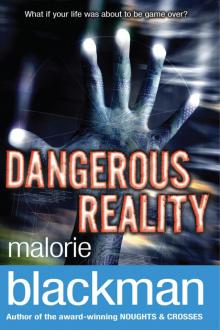 Dangerous Reality
Dangerous Reality Knife Edge
Knife Edge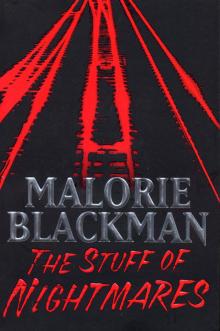 The Stuff of Nightmares
The Stuff of Nightmares Operation Gadgetman!
Operation Gadgetman! Checkmate
Checkmate Love Hurts
Love Hurts Boys Don't Cry
Boys Don't Cry Cloud Busting
Cloud Busting Pig-Heart Boy
Pig-Heart Boy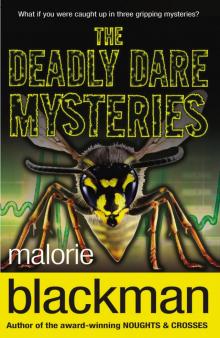 The Deadly Dare Mysteries
The Deadly Dare Mysteries Girl Wonder to the Rescue
Girl Wonder to the Rescue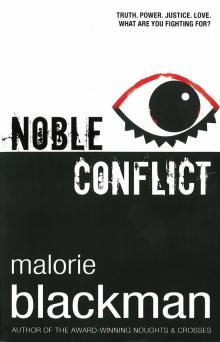 Noble Conflict
Noble Conflict The Monster Crisp-Guzzler
The Monster Crisp-Guzzler Betsey Biggalow the Detective
Betsey Biggalow the Detective Trust Me
Trust Me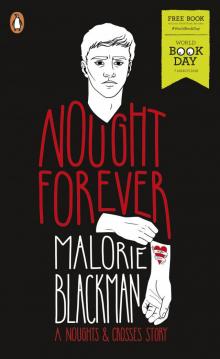 Nought Forever
Nought Forever Betsey’s Birthday Surprise
Betsey’s Birthday Surprise Dead Gorgeous
Dead Gorgeous Jack Sweettooth
Jack Sweettooth Crossfire
Crossfire Girl Wonder's Winter Adventures
Girl Wonder's Winter Adventures Whizziwig and Whizziwig Returns Omnibus
Whizziwig and Whizziwig Returns Omnibus Double Cross
Double Cross Hurricane Betsey
Hurricane Betsey Fangs
Fangs Tell Me No Lies
Tell Me No Lies Chasing the Stars
Chasing the Stars Hacker
Hacker Snow Dog
Snow Dog A Dangerous Game
A Dangerous Game Space Race
Space Race Whizziwig and Whizziwig Returns
Whizziwig and Whizziwig Returns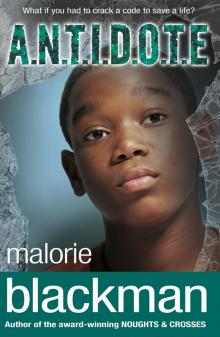 A. N. T. I. D. O. T. E.
A. N. T. I. D. O. T. E.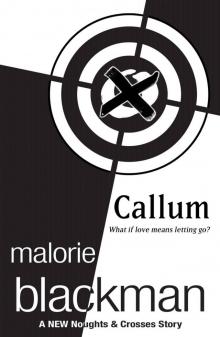 Callum: A Noughts and Crosses Short Story
Callum: A Noughts and Crosses Short Story